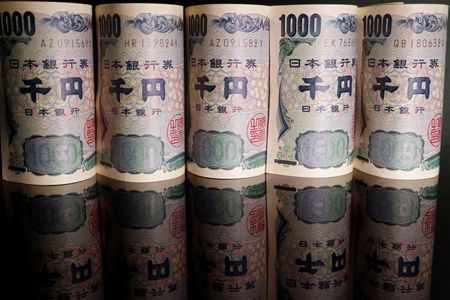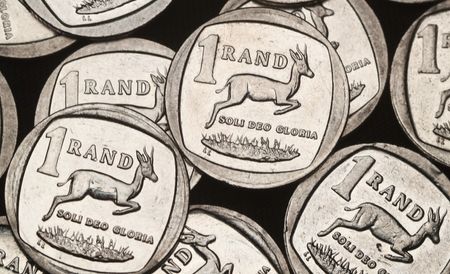By Marc Jones and Tom Westbrook
LONDON/SINGAPORE (Reuters) -World stocks were eyeing a return to record highs on Thursday at the end of the longest government shutdown on record, while an increasingly squeezed Japanese yen hit a record low versus the euro and a nine-month trough against the dollar.
Europe’s STOXX 600 made a steady start with a near 1% jump from France’s CAC 40 nudging both indexes to all-time peaks and offsetting a more than 4% dive from German engineering giant Siemens after it reported underwhelming earnings. [.EU]
U.S. stock futures meandered from slightly negative to 0.2% firmer, although MSCI’s 47-country All World Index was firmly on course for its fourth consecutive daily gain as it edged to within 4 points of October’s all-time high.
U.S. President Donald Trump signed the bill to end the government’s shutdown in the Oval Office on Wednesday.
Delayed economic data is expected to start trickling out next week. October’s payrolls figures could be the first to land with the focus on whether they will back up private surveys that have shown softness in the job market.
“We are waiting for the data fog to clear, but the one thing we can say from PriceStats data is that inflation is rolling over so it will be all about the jobs data, and that will be the driver of risk sentiment,” State Street Global Markets’ Michael Metcalfe, said.
SQUEEZED YEN
There had been action in Asia overnight too, including in the currency markets where Japan’s yen came under renewed pressure after the new premier’s latest push for the central bank to go slow on rate rises.
The yen hit a record low of 179.49 per euro and was near a nine-month trough on the dollar at 154.92.
That was despite the country’s finance minister reminding traders just the previous day that the government was watching the currency closely.
Japan’s Nikkei had closed up 0.4% and the broad Topix set an all-time high as investors shifted portfolios from the frothiest artificial intelligence firms to buy exposure to other parts of the economy. [.T]
“There is still a debate about whether the BoJ will tighten rates by year-end. Our inclination is that they will, but there is a strong market narrative that is proving hard to break that policy settings will encourage a weaker yen,” State Street’s Metcalfe added.
Elsewhere, gold hung on to recent gains and traded above $4,200 while benchmark government bonds were largely quiet with the U.S. 10-year yield at 4.09% and Germany’s 10-year yields at 2.65%.
OIL SPILLS
Hong Kong’s Hang Seng retreated slightly from a one-month high and the Shanghai Composite rose 1% ahead of credit and retail sales data due later this week.
On Wall Street, the Dow Jones Index notched a record high overnight while the tech-heavy Nasdaq retreated. [.N]
In London, the mining-heavy FTSE 100 drooped fractionally on Thursday after an all-time high the previous day. Europe’s tech stocks led sectoral gains, however, as ASML and Infineon showed signs of recovery from steep losses incurred last week. [.L][.EU]
Elsewhere in foreign exchange trade Britain’s pound briefly touched a session low after data showed its economy barely grew in Q3, while the Australian dollar ticked higher after a surge in employment figures bolstered a view that the rate-cutting cycle there may have run its course.
Brent crude futures inched down to a three-week low of $62.42 a barrel after OPEC shifted its projection to forecast a small surplus to demand in the world oil market for 2026. They had slumped 3.8% a day earlier. [O/R]
“Recent (price) weakness seems to be driven by OPEC’s revision of supply-demand balance in 2026 in its monthly report, which confirms the group is now acknowledging the possibility of a supply glut in 2026,” said Suvro Sarkar, DBS Bank’s energy sector team lead.
(Reporting by Marc Jones; editing by Sharon Singleton)










